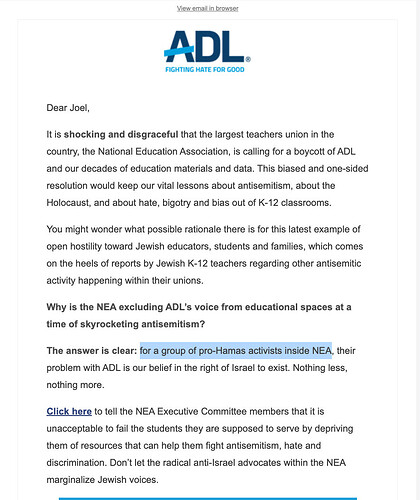And I thought getting duct taped to a chair for fidgeting was bad. That’s appalling.
“The new assessment will evaluate educators on three main aspects: knowledge of the U.S. Constitution, “understanding of American exceptionalism” and “grasp of fundamental biological differences between boys and girls,” according to a news release about the new assessment.”
Petition to refer to the ADL as the KDL…
Kapo, obviously.
Two words for the ADL, since they seem to have lost the meaning:
Never Again.
Harvard’s center for conservative scholarship is just… harvard.
True, but we all know that the Trumpists want the Charles Lindbergh Center of “Concerned Moderates”, and anything less is too liberal.
Yeah… the HItler center for ethnic studies maybe… ![]()
Josef Mengele Memorial Center for Medical Research?
Larry Nasser center for pediatric medicine
FTFY. God, i hate this timeline.
[…]
According to the Chronicle article, Freeman said, “We are in danger of producing an educated proletariat. … That’s dynamite! We have to be selective on who we allow [to go to college].”
“If not,” Freeman continued, “we will have a large number of highly trained and unemployed people.” Freeman also said — taking a highly idiosyncratic perspective on the cause of fascism —“that’s what happened in Germany. I saw it happen.”
[…]
Interesting take. I never realised the SA was a gang of intellectuals.
Can someone more informed on reading education tell me if this is a good thing or a bad thing?
https://missouriindependent.com/2025/07/11/missouri-lawmakers-ban-controversial-reading-instruction-model-as-primary-method/
I remember hearing this podcast a while ago about the whole language approach that was popular for a while and how people now believe it contributed to the problem of lower literacy rates…
I think that three-cueing is an aspect of whole language or the basis of it? I think there are other reasons why literacy rates are dropping, but this does seem like a real part of the problem and going with a more scientifically grounded approach would help?
Ok, thanks. It’s just not a subject I’m well informed on, so I don’t know whether to applaud my legislature or be mad about it, lol.
From that article:
Harper went to a professional development day at one of the district’s lowest-performing elementary schools. The teachers were talking about how kids should attack words in a story. When a child came to a word he didn’t know, the teacher would tell him to look at the picture and guess. The most important thing was for the child to understand the meaning of the story, not the exact words on the page. So, if a kid came to the word “horse” and said “house,” the teacher would say it’s wrong. But, Harper said, “if the kid said ‘pony,’ it’d be right because pony and horse mean the same thing.”
Harper was shocked. First of all, pony and horse don’t mean the same thing. Second, the idea that you look at pictures and guess when you don’t know a word seemed odd to her. “I wouldn’t have been able to use that strategy at the secondary level,” she said. There were no pictures in the books her high school students read.
The teachers described their approach to reading instruction as “balanced literacy.” Harper didn’t quite know what that meant, but her colleague Jodi Frankelli had heard lots about balanced literacy. Frankelli was the district’s new supervisor of early learning. Though her teaching experience and training were in the upper grades, too, she’d been a principal at one of Bethlehem’s elementary schools. She said it hadn’t been completely clear to her what balanced literacy was. The main idea seemed to be: Give kids lots of good books, and with some guidance and enough practice, they become readers. “We never looked at brain research,” she said. “We had never, ever looked at it. Never.”
My God, they were just winging it. And maybe using a technique they couldn’t even define and weren’t even sure what it entailed. You know, I don’t really remember learning to read, but I’m pretty sure my elementary school wasn’t just winging it like this. Did a generation just forget how to teach reading?
Yeah, it’s kind of wild how they thought that this would work to help kids learn how to read. I think they were influenced by spoken language acquisition, which is generally speaking for many kids, seamless. We just pick it up by being immersed in it. But of course, writing isn’t that old, and historically, not everyone read (I guess there is a theory that the earliest readers/writers were shamens or mystics of any community and writing was seen as a sacred thing - I think Alan Moore has talked about that?). We’re certainly all capable of learning to read and write, but it’s not innate in the same way talking is, and I think these folks just… conflated the two since they are both about human communication? The podcast got a bit into how the method developed, and it seemed like a lot of… lazy thinking maybe… or hopeful thinking? But they are two different skills, and one is more… natural, than the other? If that makes sense?

